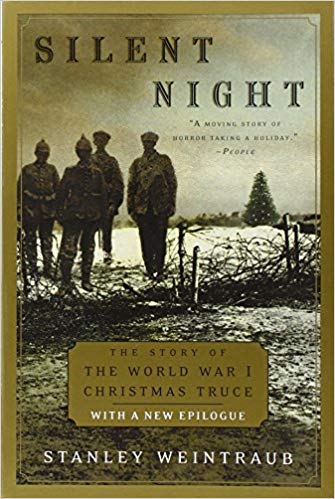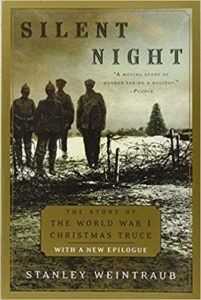

I can’t come up with lists like “these are the books I’m reading this Christmas holiday” because I read at most two books at a time slowly and methodically. For my bedtime reading, which gets me through about 10 pages before I get sleepy and turn out the light, I’m reading Fallen Founder: The Life of Aaron Burr and learning what a jerk Alexander Hamilton was. I don’t want to name the other book I’m reading because I don’t think I’ll end up recommending it: it’s a book on cigarettes that I’m reviewing for Regulation.
So what follows is a list of books that had a major effect on my life and way of thinking and/or that I just simply liked. They are not in order of importance but in the order I read them.
1. I can’t remember the name. I read it when I was home sick at about age 12. It was a book on Abraham Lincoln that leads off each chapter with a quote from the book-length poem, John Brown’s Body, by Stephen Vincent Benet. That’s when I became a Lincoln fan. My attitude to Lincoln, given the tremendous amount I’ve learned about him since, is much more complex. He was a ruthless man who did one extremely valuable thing: got rid of slavery. What is unchanged, and one of the things I got from the book, is my respect for his persistence. My favorite quote is this one in which Benet uses a dog metaphor to describe Lincoln’s persistence, and I took it to heart and made it part of who I’ve become:
A young dog can outrun him any time,
Outlook him and outeat him and outleap him,
But, Mister, that dog’s hell on a cold scent
And, once he gets his teeth in what he’s after,
He don’t let go until he knows he’s dead.”
2. Pride and Prejudice, by Jane Austen. We covered it in high school, but I read it three times because I loved it so much. I still have to be reminded of the lesson: don’t make quick judgments but, instead, get more information when that is low cost.
3. Yes, I Can, by Sammy Davis, Jr. I read this during the summer between high school and college. The way he ran his career and the way he dealt with racial discrimination was inspiring.
4. Elmer Gantry, by Sinclair Lewis. My aunt, who was more evangelical than the minister she was married to, convinced me that I would burn in hell if I didn’t become born again. I kept trying to be born again and I kept failing at it. When I read this book the same summer as #3 above, I relaxed.
5. The Fountainhead, by Ayn Rand. I read it in my third month of college. If I hadn’t done so, I’m not sure I’d be a libertarian, an economist, or an American. It, and Ayn Rand generally, influenced a huge number of the choices I made, most very good, one bad. My recommending it, by the way, doesn’t mean that I recommend some of the major things in the book. The two that I disagree profoundly with are rape and destroying other people’s property. I’m too much of a libertarian to go along with that.
6. To Kill a Mockingbird, by Harper Lee. I loved the way Atticus kept his principles while still dealing in an every day world that he didn’t create. This helped me work in jobs where Howard Roark would have had trouble. I reread this book every decade.
7. The Virtue of Selfishness, by Ayn Rand. This book, more than any other, convinced me that you could actually think about many issues and often resolve them or at least narrow them down. My favorite was her essay on racism as a crude form of collectivism.
8. Capitalism and Freedom, by Milton Friedman. Besides learning a lot of economics and some history from this book, I also learned that one can be relatively radical and successful in the mainstream.
9. The Road to Serfdom, by Friedrich Hayek. My friend Perry Taylor gave this to me for Christmas in 1968. When I started to read it, I hated it. I couldn’t stand the fact that Hayek treated his intellectual foes with respect rather than attacking them. He kept pulling his punches. When I picked it up to read about 6 months later, I loved it. Not only did I learn his explicit message, but also I learned a style of debate that I still practice: zeroing in on the issue and assuming good intentions of the “other side.”
10. The Calculus of Consent, by James Buchanan and Gordon Tullock. I read this during the year I took off to study economics on my own. My introduction to public choice. I wrote separate fan letters (at age 20) to Buchanan and Tullock. Both answered gracefully and with actual content.
11. The Theory of Price, by George Stigler. I read this during that same econ study year. I loved the mix of theorizing and more-than-casual empiricism. After Stigler died, as a tribute to him I reread the whole book and realized just how much of what I thought I came up with to use in class, I had learned from Stigler.
12. University Economics, by Armen Alchian and William R. Allen. I TA-ed from this book my first year in graduate school at UCLA. Every Sunday afternoon and evening, I would work my way through a chapter and through every single question at the back of each chapter. I did so just in case some 18-year-old the next day in my TA section asked a question from the back of the chapter. It never happened. But I learned more from this book my first year at UCLA than from any other.
13. A Guide to Rational Living, by Albert Ellis. I hit some bumps in my last year in the Ph.D. program at UCLA. I got extreme writer’s block and was getting nowhere on my dissertation. I write about this in Making Great Decisions in Business and Life, co-authored with Charley Hooper. Actually there was one evening in July 1975 when for a few hours I had an intense desire to commit suicide. I had the sense to tell a friend and ask him to talk me out of it. He did. But I realized that I shouldn’t wait until the next time I wanted to commit suicide. Instead, I went to see a Los Angeles therapist, Roger Callahan, who gave every one of his new patients a copy of Ellis’s book. That one book helped me with my writer’s block and has helped me deal with so many life situations.
14. Lucky Jim, by Kingsley Amis. This fun book helps me not take academic bulls**t too seriously. I reread it every decade. Now that I’ve left academia, though, I don’t feel the need to read it yet again.
15. How I Found Freedom in an Unfree World, by Harry Browne. When I was visiting a friend in Australia in 1999, I found this book in his library and decided to reread it. I had first read it the late 1970s. I had the same kind of experience I’d had when rereading Stigler: I realized that I had used a whole lot of Browne’s ideas in my life but had thought I had come up with them.
16. The Autobiography of Malcolm X, by Malcolm X and Alex Haley. I loved the story of Malcolm X’s struggle and how he turned away from a life of crime and became a strong man.
17. The Ropes to Skip and the Ropes to Know, by Richard Ritti and G. Ray Funkhouser. I learned more about how to survive and thrive in organizations from this book than from anything else in my life. I read it when I started the job at the Council of Economic Advisers and it helped immensely. Moreover, I could see how I had screwed up at the Cato Institute in 1979-80 by not having followed these lessons.
18. The Commanding Heights: The Battle Between Government and the Marketplace that Is Remaking the Modern World, by Daniel Yergin and Joseph Stanislaw. I reviewed it in the August 3, 1998 issue of Fortune. It was one of my last reviews, possibly my last review, for Fortune, because the editor chopped up and deadened the review so badly. So on my own web site (which, shamefully, I have not kept up for the last 5 years), I have the version of my review that I like, as well as the one that was published. The biggest difference is the last paragraph. The Fortune editor had substituted a sarcastic commentary and we reached a so-so compromise. Here are the last two paragraphs that I wanted:
Lead author Daniel Yergin seems to have undergone his own intellectual odyssey. In Energy Future, a 1979 book he co-edited, Yergin expressed deep skepticism about the free market’s ability to allocate energy efficiently and advocated mandatory conservation of oil and large subsidies to solar energy. Yergin now seems to appreciate the power of markets in allocating resources.
Yet Yergin is still skeptical. The authors write that capital markets create financial risk, whereas financial economists have shown that capital markets allow people to contract out of risk and sometimes allow an overall reduction of risk. Also, the authors question whether economic freedom can satisfy the yearning for “some higher meaning beyond materialism.” Leftists during the Spanish civil war, they write, “are said to have died with the word Stalin on their lips.” Few people, they claim, “would die with the words free markets on their lips.” “Free markets” is admittedly a clunky term; I prefer “freedom.” But if I had to choose which words to utter with my dying breath, the choice between the name of a mass murderer and a system that has liberated mankind would not be a close call.
19. Silent Night by Stanley Weintraub. The subtitle is “The Story of the World War I Christmas Truce.” I wrote a piece on it for antiwar.com titled, simply, “Silent Night.”

READER COMMENTS
David Seltzer
Dec 30 2019 at 4:47pm
Two that I am reading again, Economics In One Lesson and Bastiat’s That Which is Seen And That Which is Unseen. My favorites are Huckleberry Finn, The Sun Also Rises and The Great Gatsby.
Comments are closed.